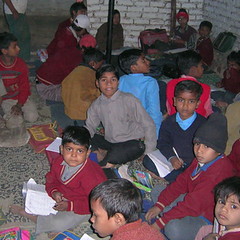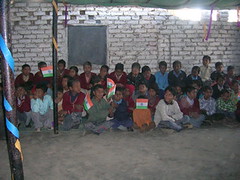by Anuradha Bakshi | Jun 1, 2007 | reservations
Tuesday morning some French friends set out from our home to board a train to Rajasthan. They were on a three week holiday and were hoping to be able to visit as many places as possible. As they were leaving, I told them rather casually to get in touch in case there was any problem. It was almost a redundant statement as so many friends had boarded trains to Rajastan and come back safely their eyes and mind filled with lifelong memories.
Imagine my astonishment when a few hours a later I got a panicked call informing me that their train had been stuck for hours and asking me what was happening and above all what were they to do. having been at work all day, I had not seen the news and did not know what had hit them. I just told them to hold on and that i would get back to them shortly.
I quickly turned the TV and was assailed by images of buses burning amidst a sea of people and tried to figure out what had happened. Slowly reality sunk in as I realised that once again the hydra headed monster of reservation has struck in a new way.
The friends have altered their holiday plans and set out for the hills but for the last few days I have been watching in stunned silence the horrific drama that is unfolding in front of our eyes. This is the reservation nightmare revisited but in another avatar altogether. Here it is not a question of the upper caste resisting an increase in reservation. What we are witnessing is far more insidious and dangerous as it defeats the very essence of what reservation is meant to stand for.
What was meant to be an affirmative action to help those who had been let down by society for generations, what was meant to be a help for the underprivileged sections has now turned out to be a battle to save one’s spoils. The Gujjar community is seeking scheduled tribe status, something that can be defended as this is a backward community of herdsmen. What is scaring is that over and above the political issue, resistance to this is not from upper castes but from another ST section, namely the Meena who are apparently the only recognised Tribals in Rajasthan. One does not have to be a rocket scientist to see that all this is a far cry from affirmative action for the underprivileged. A new entrant entails having to share the spoils which include government jobs, political assignments, etc..
One would have thought that brethren were to be supported and helped but that is not the case as reservation is no more viewed as a time bound support to the have nots to ensure their mainstreaming, but as an easy way of getting favours and once again the monster of reservation has proved to be stronger than the administrative machinery as it is replete with causes to espouse for many hungry politicos.
How this will end I do not know. The confrontation has turned into a caste struggle that is turning ugly and a vindication of the fear that of the polarisation and fragmentation of our already fragile social fabric and a proof of the failure of the reservation policy as it has been imagined by its authors.
by Anuradha Bakshi | Apr 25, 2007 | reservations, two indias
Last week two men came to help us with some work at home. Like many others who eek their living on a day-to-day basis they were picked up from the chowk or road side where they sit from the early hours of the morning in the hope that someone would come by and give them work.
Both had lost their jobs in factories, as many do in Delhi, but had refused to lose hope. Over a cup of tea they shared their story in a dispassionate way. Hazari the elder of the two hails from Bihar and has five children. His wife does not work and it is his measly 3000 rs that keeps them going. All his children go to school and his elder daughter is in class IX. His dream is to ensure that she completes her XIIth.
Hazari belongs to one of the reserved classes but has no idea of what that simple appartenance can get him. He has never heard of reservation and has never availed of any of the sops doled out regularly. His day-to-day survival does not give him the luxury of taking time off to get the required papers ratifying his social or economic status. Yet Hazari refuses to give up his dreams for his children, the very reason he left his home to come to this soulless city.
It was poignant to see that this conversation was happening at the very time when heated debates on reservations are once again dividing the nation and the fate of the creamy layer is being veted. This man like many others in our land was just busy surviving and holding on to his dreams. He is already a winner as he has beaten many odds. In a city where children drop out with alarming regularity, his daughter has held on and made it to class IX.
As I mused on about this innocuous meeting, I came across a news item stating that an IIM alumni body had gone to the Supreme Court questioning the validity of a 56 year old caste-based reservation system. What caught my eye were two quotes of from Jawahar Lal Nehru. The first reminded us of his dream of a ” young and vibrant nation, free from the vices of caste and communal divide“. The other went on to state: ” I dislike any kind of reservation. more particularly in services. I react strongly against anything that leads to inefficiency and second rate standards. I want my country to be a first class country in everything. The moment we encourage the second rate we are lost“.
A mere glance at today’s India 60 years after freedom shows that Nehru’s vision has been long forgotten. The debate on the creamy layer is sufficient to show that the very purpose of reservation or affirmative action has been defeated. While the battle rages about the 27% OBC reservation in institutes of higher learning, 6 decades of Independence have not been able to enforce the right to primary education.
It stands to reason to believe that for any affirmative action to be honest, excellence has to begin at the very bottom of the ladder: ie in state run primary schools. Our tiny experience at pwhy has proved beyond doubt that children from underprivileged backgrounds can be stellar performers if given a little help. To cite just one example, Farzana a two times failure in class VII got 83 % at her Xth Boards. Sadly as debates go on, the state of municipal schools in India’s capital city seem to be getting worse by the minute. A mind boggling number of potential aspirants to higher learning drop out of schools because somewhere down the line each one of us has failed them.
The IIM alumni effort is one in the right direction. It is time to define the validity of a reservation policy that seems to be doing more harm than good, as it is fracturing our society with impunity. Any affirmative action has to be time bound. Otherwise it will lead to impairing rather than helping. Alas, as long as such policies provide fodder to vested interest, solutions will be difficult to find.
by Anuradha Bakshi | Apr 13, 2007 | reservations
It took a shocking story to get the Government to look into the matter of burial sites for little children in India’s capital city. Politicians ignore Nithari in the run up to the state elections in Uttar Pradesh, as the families of the dead children are simple migrants and hence do not have votes. The Ghaziabad Girls are lost in administrative and judicial quagmire. Children are beaten in schools. The drop out rates are mind boggling. Child labour is rampant. Orphanages are cramped and unsafe.
Something is terribly wrong…
We are talking about the millions of children in free India, the third or fourth generation after Independence. We are talking about children who see the day of light in a democracy that professes to give them a host of fundamental rights: from education to shelter, from freedom of speech to freedom of faith. And yet a cursory glance and the plight of many of them is enough to prove that each right has been denied, usurped or hijacked.
It is not that we have done things wrong. A passing glance at the multitude of child related programmes is sufficient to see that children have occupied a place of pride in our planning, and on paper many of the proposed projects are excellent.
Let us just talk of the ICDS (Integrated Child Development Scheme) to substantiate our point. This programme was conceived and launched in 1975. Its objectives were as follows:
- to improve the nutritional and health status of pre-school children in the age-group of 0-6 years;
- to lay the foundation of proper psychological development of the child;
- to reduce the incidence of mortality, morbidity, malnutrition and school drop-out;
- to achieve effective coordination of policy and implementation amongst the various departments to promote child development; and
- to enhance the capability of the mother to look after the normal health and nutritional needs of the child through proper nutrition and health education.
What a great programme. Had it worked all other child related programmes should have worked too! But the reality is quite different. In 2007 – 32 years after the programme was launched – an ICDS creche in India’s capital city often runs from a space the rent of which cannot exceed Rs 500! In actual terms this means a tiny airless room devoid of what is deemed essential as per the programme: running water, toilet facilities, open space for children to play.
The state of municipal schools is another reflection of the place children have in free India. After sixty years many schools in our capital still do not have proper buildings, let alone other facilities! There are some exceptions, but these are often dependent on the commitment of a handful of honest individuals.
On the other hand, politicians are busy framing reservation policies to higher institutions of learning and the ensuing debates make us wonder who these places in he sun are for. Certainly not for the potential drop out. Somehow no one seems to be bothered about the state of primary education, though poor parents are slowly seeing the writing on the wall and are now often seen sending their children to private institutions that are now mushrooming in our city and are often of poor quality. Yes in India at sixty we have the private school for the poor with names like SK convent, Mother Sundari English Medium School etc, and they come at a heavy price!
My detractors will be quick to point that it is allright to criticise but what about possible solutions. Many do come to mind but what stands out is the necessity of bridging the gap between the rich and the poor, of striking a balance, of reaching out and doig our ‘bit’! What is needed is to raise awareness. What is needed is to stop for an instant and ask oneself a simple question: where are we going? What is needed is to understand that the plight of the other India will one day affect us in more ways than one.
How can a city not have proper habitat for the poor within it? One cannot just wish them away and hope they will remain invisible. How can a city have schools that do not run, privatising them is again not a solution, they have to be strengthened and improved. The judiciary or the media should not have to intervene each time things go wrong.
Ultimately it all comes down to striking a proper balance between our rights and our duties as citizens, something we seem to have conveniently forgotten.
How many more generations of children will have to be born and become adults before we realise this!
by Anuradha Bakshi | Mar 31, 2007 | reservations
The supreme court order staying the OBC reservation issue has leashed out a series of reactions across the land. This time I kept my pend in check waiting before adding my two penny bit.
Last summer was one of discontent as many young students took to the streets to protest: each each side having its protagonists. Students sat on hunger strike, gandhigiri made the journey from screen to street. No one really heard as the powers that be huddled together and got what they wanted or so they thought.
Institutional heads were roped in and some wishy-washy formula was evolved. Quietly petitions were filed in the highest court but the hubris was such that it would even take on the Gods!
Then came the supreme court stay order, a rude wake up call that sent everyone into a flurry. bandhs were called, protests abounded a new cause was found to defend setting the dreaded caste and social divide into motion. Passionate debates were aired on TV and strangely every voice of reason was shouted down by those with extreme positions.
As if no one wanted to find a solution. A retired Professor echoed my thoughts as I tried desperately but in vain to highlight the sad reality about the abysmal state of primary schools. His effort to steer the debate in that direction was countered by a venomous retort branding him as an enemy, validating the point that I have often made about the conscious effort of the powers that be to ensure that a large segment of the population remain illiterate and hence a vote bank easily manipulated.
As the debate carried on one realised that no one was actually interested in the plight of the little Ramus and Jyotis who may have been born in the right caste but who will remain illiterate and whose only hope will be little efforts like project why that ensure that they do not drop out of the gaping holes of the education net.
Last week I went to the Greater Kailash outlet of Cafe Coffee Day. To my utmost surprise a beaming young man in his smart red uniform came to my table and said: Ma’am don’t you recognise me, I am Shiv and was a student at project why! I was taken aback as I remembered him 5 years ago still a shy adolescent who barely spoke.
I must say he was not standing at the portals of an IIT or IIM, but somehow he had stepped on the other side of the fence on his own merit, without reservation with just a little help because someone had believed in him.
The reservation issue will never die as no one will allow it to. It is to good a cause for politicians and for what is now known as the creamy layer. For those who barely survive nothing will change; no one wants it to.

by Anuradha Bakshi | Jan 26, 2007 | reservations

Final exams are just little over a month away and all pwhy kids are busy revising. Government schools held their usual end of term exams in December and we all waited for the results to help us structure our revision programme.
When no result was forthcoming by mid January, we asked the children to find out from their class teachers when these would be available. The next day, little Jyoti from our Govindpuri section came back telling us that she had been slapped by her teacher for having dared ask! We were ready to go and meet the teacher in question but were stopped by the children. Their scared eyes spoke volumes. They knew that our visit would result in more unwarranted abuse.
In another school, children were told that the papers had not been checked as schools had been closed for a few days because of the severe cold. In yet another school, answer sheet lay strewn on the floor at the mercy of rodents.
All in all, we could only gather half of the results.
This is but another example of the state of municipal and government schools. It is a cause of worry as marks of each terminal exam are included in the finals. We were also told that if a child has 75% attendance he automatically passes into the nest class. No wonder than that there are kids in class V who are unable to read or write. They will swell the ranks of drop outs as they reach class VI!
Almost everyday one can find some news item or the other about the abysmal state of government schools in the capital: no toilets, no drinking water, no classrooms, no teachers…One of the reasons for this deplorable situation is undoubtedly the lack of a literate and empowered parents’ group. With the proliferation of shady small teaching shops a.k.a. public schools, only the poorest of the poor land in municipal schools. They simply sit on the benches – or floor – marking time till they exit the school in class V. many will never make it further.
There is something extremely lopsided or insidious about the various policies for the poor. One startling example is the reservation policy in higher education. With the present state of primary education no deserving candidate can ever make it to the portals of an engineering college or medical school. It is only when we clean up the state of primary education that a tangible change can begin to happen.

by Anuradha Bakshi | Jan 26, 2007 | reservations

All over India celebrations are on today. Flag hoisting and parades, people cheering and waving flags everything is on cue to mark the 57th anniversary of our Republic. How many of us are truly aware of the meaning of this day?
Somehow the essence of the constitution got lost along the years and what remained is the pomp and display associated with it.
Of all our centre there is one that never fails in its celebrations of our republic our Independence days. Every 26/1 and 15/8 the children of the Okhla centre organise a show. They hoist the flag, sing the national anthem and some patriotic songs and then delight us with the never to be missed bollywood numbers. This year they even had a play and their on gandhiji!
It is with pride and a tinge of sadness that I watch these children. As they remember the day that saw our constitution come into force, I cannot but think about how little of what was promised to them 57 years ago, has actually come their way. It seems as one part of India was conveniently cast aside along the way.
Most of these kids belong to some reserved category or the other but none is aware of what reservation means. They go to poorly run schools from where many drop out. They die for want of medical care. Their morrows are often hijacked by some predator or the other and they soon find themselves on the wrong side of the law. And often they go to sleep hungry.
And yet on these special days all is forgotten as they celebrate being Indians.
This year the President chose to mention crime against children in his R Day address. He was of course referring to cases like Nithari. But there is a more insidious crime tat we are all guilty of, one that is invisible and almost intangible. That of having let down a whole slice of India denying them the basic rights that were meant to be for all Indians.
The children of Okhla did not forget the importance of this day; in their eyes lies a question that needs to be answered: why have they been forgotten them.







